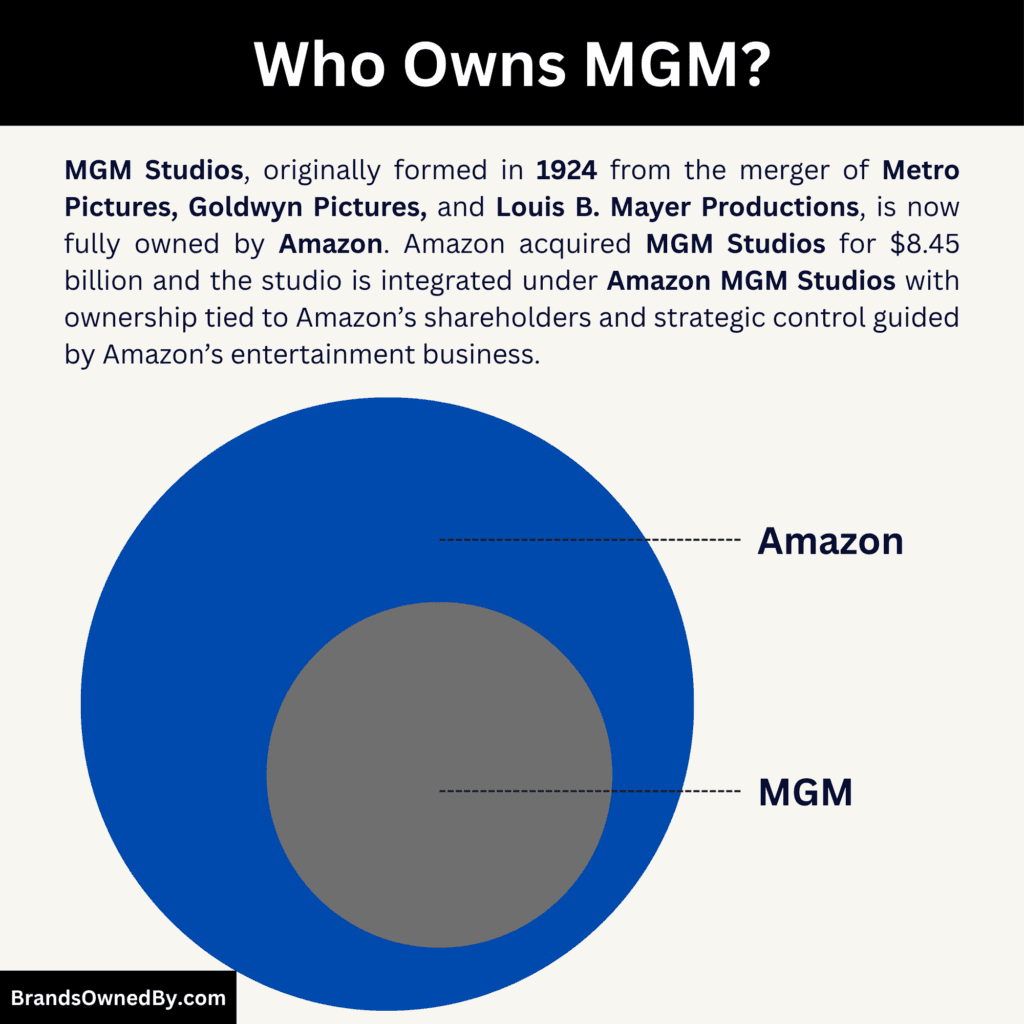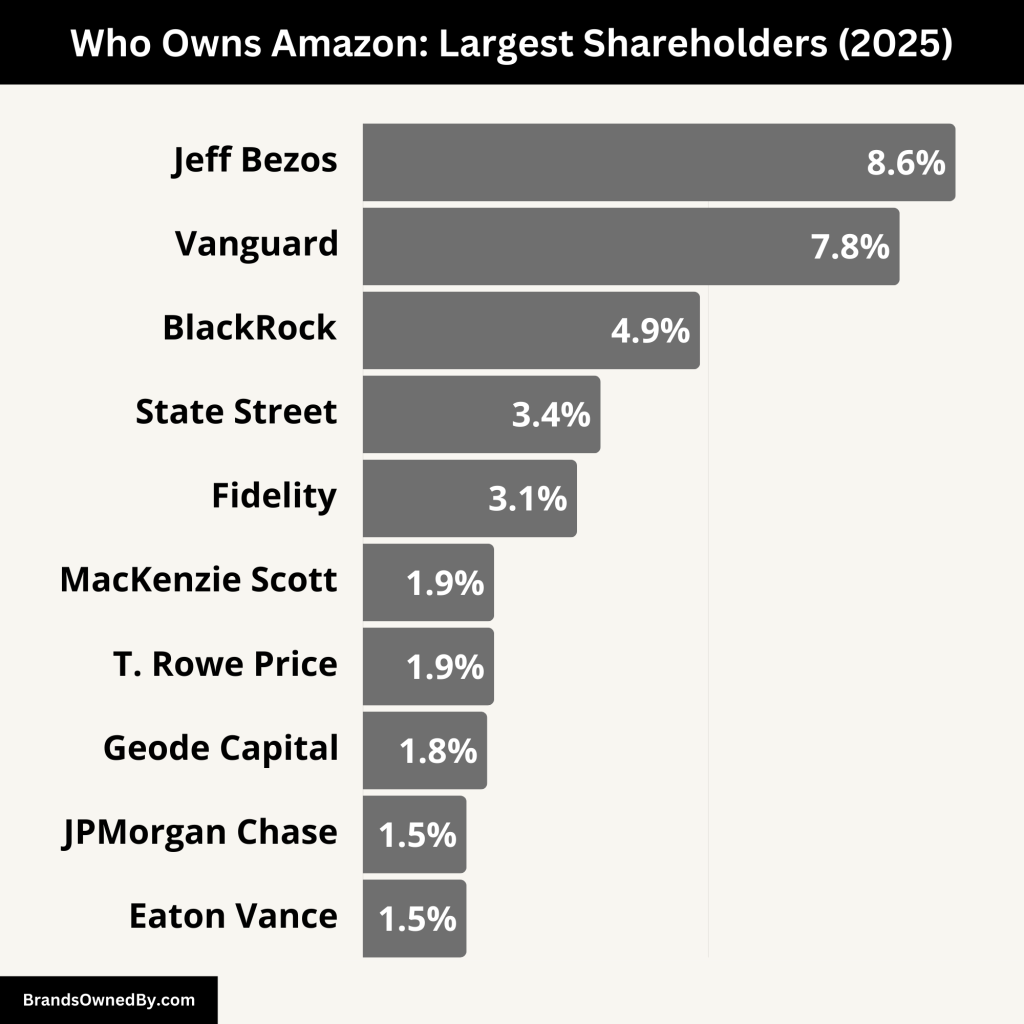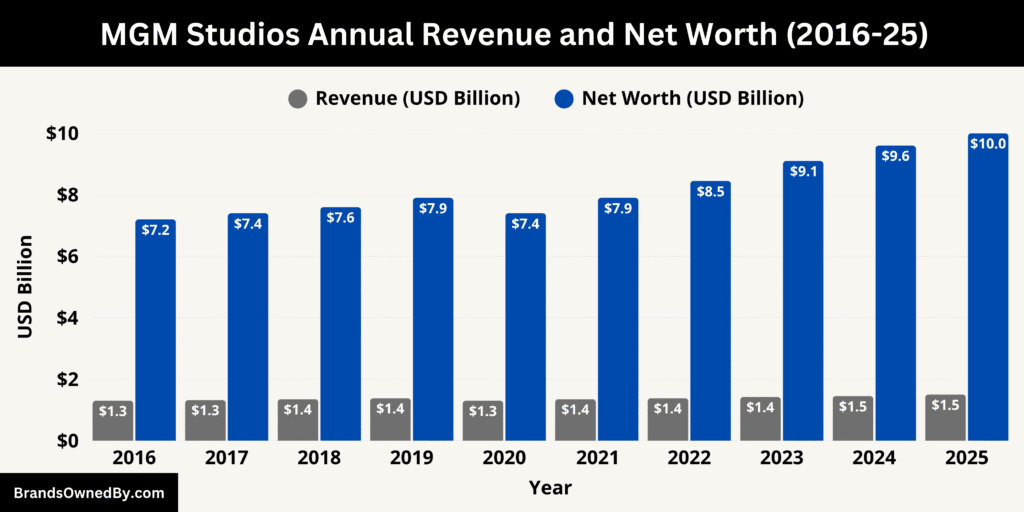If you are searching for who owns MGM, it refers to Metro-Goldwyn-Mayer Studios, a legendary Hollywood film and television studio. MGM is famous for its roaring lion logo and blockbuster movies. This article explains MGM’s ownership, company profile, leadership, financials, and the brands and subsidiaries it owns as of 2025.
Key Takeaways
- Metro-Goldwyn-Mayer Studios Inc. (MGM Studios) is fully owned by Amazon, following its acquisition and integration into Amazon’s MGM Studios.
- Amazon’s shareholders indirectly own MGM, with major influence coming from institutional investors and founder Jeff Bezos as the largest individual shareholder.
- MGM’s leadership and business decisions now align with Amazon’s global entertainment strategy, focusing on streaming growth and franchise expansion.
MGM Studios Profile
Metro-Goldwyn-Mayer Studios Inc. (MGM) is a legendary American film and television studio known worldwide for its iconic roaring lion logo and massive entertainment legacy.
The studio produces movies, series, digital streaming content, and holds rights to some of the biggest franchises in Hollywood history. Now operating under Amazon MGM Studios, MGM continues to be a major force in global entertainment, combining its classic heritage with modern streaming and franchise expansion.
Metro-Goldwyn-Mayer was established in 1924 and remains one of the oldest surviving studios in the industry. Its headquarters are in Culver City, California. MGM developed a reputation for glamour, cinematic excellence, and nurturing Hollywood’s biggest stars.
Today, MGM’s operations include:
- Film and TV production
- Distribution across theaters and streaming platforms
- Franchise management and licensing
- A vast content library spanning 100+ years.
MGM is uniquely positioned to blend theatrical blockbusters with digital storytelling, aligning iconic Hollywood filmmaking with Amazon’s global streaming network.
Founders
MGM was formed through a groundbreaking studio merger led by some of the most influential figures in early Hollywood:
- Marcus Loew: The mastermind behind the merger. He owned a large theater chain and wanted a strong supply of films for his cinemas. His vision directly created Metro-Goldwyn-Mayer in 1924.
- Louis B. Mayer: After the merger, Mayer became MGM’s first studio chief. He built the company’s star system, bringing in legendary actors and creating the glamorous MGM identity that dominated its early era.
- Samuel Goldwyn: His earlier company, Goldwyn Pictures, was a major piece of the merger and contributed both branding and industry prestige. Even though Goldwyn was not involved in management afterward, his name became permanently iconic through MGM.
Together, these founders sparked a studio known for luxury, innovation, and global influence in cinema.
Major Milestones
- 1924 – Metro Pictures, Goldwyn Pictures, and Louis B. Mayer Pictures merge to form MGM.
- 1928 – The iconic roaring lion logo is first used with sound.
- 1938 – MGM produces Sweethearts, one of the earliest full-color features using the new three-color Technicolor process.
- 1939 – The studio releases landmark films and solidifies itself as Hollywood’s leading studio in the Golden Age.
- 1957 – MGM expands its business into television production and the small-screen era.
- 1965 – A catastrophic vault fire at MGM’s Culver City studio lot destroys numerous silent and early sound films.
- 1969 – Investor Kirk Kerkorian seizes control of MGM, initiating a shift in strategy from pure filmmaking to diversified entertainment holdings.
- 1980s – MGM releases major films such as Rain Man (1988) and The Silence of the Lambs (1991), reinforcing its franchise and award-winning credentials.
- 1997 – MGM acquires Orion Pictures, boosting its library of content and opening new production avenues.
- 2010 – The studio emerges from bankruptcy and refocuses on being a lean, franchise-driven production house.
- 2022 – Amazon.com, Inc. completes the acquisition of MGM and integrates it under the banner “Amazon MGM Studios”.
- 2023 – Amazon MGM Studios revives the historic United Artists label, bringing back the legacy brand into a modern content strategy.
- 2024 – MGM celebrates its 100th anniversary (founded 1924) with a special “100 Years of Entertainment” logo variant and curated releases from its film library.
- 2025 – The studio solidifies its streaming-first strategy, announcing new global distribution partnerships and taking creative control of major franchises under Amazon MGM.
Who Owns MGM?

Metro-Goldwyn-Mayer Studios Inc. (MGM) is a wholly owned subsidiary of Amazon. It operates under the larger umbrella of Amazon MGM Studios, Amazon’s entertainment division. MGM is no longer publicly traded. All ownership authority rests with Amazon, which now manages MGM’s decision-making, investments, and growth strategy.
With Amazon’s backing, MGM benefits from a global technology and distribution network. This includes theatrical releases, international distribution, and streaming through Prime Video. MGM’s content now serves strategic goals such as expanding Amazon’s subscriber base and enhancing global entertainment offerings.
Parent Company: Amazon
Amazon MGM Studios is Amazon’s consolidated entertainment powerhouse. It combines:
- MGM Studios – century-old film and TV production legacy
- Amazon Studios – Amazon’s original streaming and film unit.
This merged structure allows MGM to maintain its iconic branding while leveraging Amazon’s technology, audience reach, and streaming dominance. The lion logo and MGM name still appear on releases, preserving the brand’s cultural value.
Leadership is shared within a broader management framework that aligns MGM content pipelines with Amazon’s global distribution and franchise strategy.
Since Amazon owns Metro-Goldwyn-Mayer Studios Inc. (MGM), the ultimate ownership of MGM depends on Amazon’s shareholders. Amazon is publicly traded, so its ownership is divided among individual shareholders, institutional investors, and company insiders.

Amazon’s largest individual shareholder is founder Jeff Bezos. His ownership stake gives him meaningful influence over high-level strategy, including major acquisitions such as MGM. Bezos is no longer CEO, but he remains Executive Chairman and holds a leadership role in long-term direction and innovation across the company, which directly impacts MGM’s future priorities.
A significant portion of Amazon is owned by institutional investors, including major asset management firms and investment groups. These institutions own large blocks of Amazon shares through index funds, pension funds, and investment portfolios.
The biggest ones include The Vanguard Group, BlackRock, and State Street. While each firm holds under 10% individually, combined they represent the largest controlling influence. These investors expect growth in Amazon’s streaming and entertainment business, making MGM a strategic asset that must perform.
Acquisition Insights and Full Background
Amazon’s goal was to strengthen Prime Video by acquiring:
- A massive content library with thousands of titles
- Iconic franchises like James Bond, Rocky/Creed, and The Pink Panther
- Production capabilities for blockbuster theatrical content
- Licensing and merchandising power from legacy IP.
Content depth is crucial in the streaming era, and MGM’s 100-year legacy made it a prime target.
Deal Timeline
- May 2021 – Amazon announces intent to acquire MGM
- 2021–2022 – Regulatory reviews in the US and the EU
- March 2022 – Acquisition completed, MGM officially becomes part of Amazon
- Late 2023 – Formation of the unified brand Amazon MGM Studios, finalizing operational integration.
What Amazon Gained
- One of the most valuable entertainment libraries in the world
- Rights to continue producing films under beloved franchises
- Access to MGM TV shows is fueling streaming expansion
- Physical production hubs and long-established industry relationships.
This acquisition allows Amazon to compete more deeply with streaming giants like Netflix, Disney, and Warner Bros. Discovery.
Intellectual Property Ownership
MGM’s ownership is not just about a company — it is about control of storytelling rights.
Amazon now holds:
- Copyrights to thousands of classic and modern films
- Long-form and short-form TV IP
- Distribution rights for many well-known franchises
- Future development rights for sequels, spinoffs, and reboots.
This gives Amazon long-term revenue potential beyond streaming — including licensing, theatrical releases, merch, and gaming.
Operational Identity
Even though the parent company fully controls MGM:
- The MGM brand continues independently within the industry
- The roaring lion logo is still used, now updated with 2020s animation
- MGM maintains strong creative teams, talent relationships, and studio identity.
Amazon didn’t buy a dying studio — it bought a living brand with deep history.
Strategic Future
Under Amazon, MGM is focusing on:
- Franchise expansion
- Global theatrical + streaming hybrid releases
- Reviving legacy titles for new audiences
- Strengthening international storytelling through co-production.
The acquisition marks a new era where MGM blends its Hollywood legacy with Amazon’s digital-first vision.
Who is the CEO of MGM?
Metro-Goldwyn-Mayer Studios is now operated under Amazon MGM Studios. The executive leading this combined entertainment division is Mike Hopkins, who oversees both Prime Video and MGM Studios operations. While his official title is not “CEO of MGM,” he is the highest-ranking executive directly responsible for MGM’s strategy, content decisions, and performance globally. In practical terms, he functions as the top leader guiding MGM’s present and future.
Background and Leadership Role
Mike Hopkins joined Amazon in 2020 with decades of industry experience. Before this, he led Sony Pictures Television, managing global distribution and large-scale content operations. At Amazon MGM Studios, Hopkins supervises film development, theatrical releases, television production, and the integration of MGM’s well-known franchises into Amazon’s entertainment portfolio.
He works closely with creative teams, international distribution partners, and Amazon’s executive leadership to modernize MGM’s content strategy for a global streaming audience. His leadership emphasizes expanding MGM’s franchises, reviving classic stories, and accelerating premium content output for Prime Video.
Influence on MGM’s Direction
Hopkins plays a direct role in shaping MGM’s future. Since MGM is no longer an independent studio, its operational autonomy is replaced by a unified strategy under Amazon’s global business priorities. Hopkins prioritizes projects that strengthen Amazon MGM Studios as a major competitor in both theatrical films and streaming.
His guidance affects:
• Which MGM film and TV projects move forward
• How major franchises like James Bond and Rocky/Creed evolve
• How MGM’s library supports Prime Video subscriber growth
• The balance between theatrical releases and streaming launches
Because of this centralized leadership, MGM’s legacy continues — but through a modern lens focused on global reach and streaming-driven success.
MGM Studios Annual Revenue and Net Worth

As of 2025, MGM Studios continues to perform strongly in the entertainment market through its films, television productions, and global distribution network. Industry analysts estimate MGM’s 2025 revenue at approximately $1.5 billion, driven by a combination of theatrical releases, streaming partnerships, franchise development, and licensing income. The studio’s net worth in October 2025 is estimated at $10 billion, reflecting its valuable intellectual property and strategic position within Amazon MGM Studios.
Revenue in 2025
MGM’s revenue today comes from multiple channels including theatrical releases, global licensing agreements, television production, and digital streaming. Domestic theatrical revenue in 2025 is estimated around $110 million, reflecting the studio’s continued presence in cinemas. However, theatrical performance now represents a smaller portion of total earnings due to the industry shift toward streaming platforms.
The majority of MGM’s revenue is generated through Amazon’s distribution network. Films and series released under the MGM banner gain instant worldwide exposure on Prime Video, ensuring recurring revenue through international streaming performance and long-tail viewing. The studio also continues to profit from syndicated reruns, international broadcast rights, and home entertainment sales.
Net Worth
The estimated $10 billion valuation is supported by four core pillars.
First, MGM owns one of the most historic and commercially valuable film and TV libraries in the world, consisting of thousands of marketable legacy titles.
Second, its franchise portfolio includes global properties such as James Bond, Rocky/Creed, and The Pink Panther, which continue to generate sequel and merchandise revenue.
Third, the MGM brand itself carries premium recognition that retains commercial credibility in film and television markets.
Finally, Amazon’s ownership provides stronger financial backing, technological integration, and global reach that elevate MGM’s long-term earning potential.
Ongoing Financial Outlook
MGM is benefiting from Amazon’s aggressive content investment strategy. The studio is expected to deliver more franchise expansions, reboot familiar stories from its vast library, and increase production volume tailored for streaming audiences. Amazon’s support allows MGM to take on larger projects while reducing the financial risks that independent studios face.
The future outlook remains positive. MGM’s franchise-driven approach, combined with consistent revenue from its iconic catalog, positions the studio for sustained profitability. The roaring lion continues to symbolize not just cinematic history, but strong financial resilience in the modern entertainment era.
Companies Owned by MGM Studios
MGM Studios oversees a broad portfolio of entertainment brands, production divisions, and franchise rights that continue to shape its identity in the global film and television market.
Below is a list of major companies and brands owned by MGM Studios as of October 2025:
| Company / Brand | Type | Key Focus & Role | Strategic Importance |
|---|---|---|---|
| Orion Pictures | Film Production Label | Director-driven films, genre experimentation, mid-budget theatrical releases | Builds creative credibility, attracts diverse filmmakers, fuels festival and awards presence |
| United Artists Releasing | Theatrical Distribution Brand | Distributes MGM films to cinemas under the historic UA branding | Preserves MGM’s theatrical identity and supports big-screen franchise releases |
| MGM Television | TV Production Division | Scripted, unscripted, limited series, and co-productions for global networks and streamers | Major revenue engine due to continuous content demand and global syndication |
| MGM+ (formerly Epix) | Premium Network & Streaming Platform | Original series, exclusive films, curated MGM library content | Direct-to-consumer monetization and global brand expansion |
| MGM Animation & Family | Animation and Family Content Studio | Animated movies, family franchises, youth content, character-driven IP | Builds future audience loyalty and supports merchandising growth |
| MGM Worldwide Television Distribution | Global Licensing & Syndication | International distribution for MGM’s film and TV library and new releases | Recurring global revenue through rights sales and platform partnerships |
| MGM Consumer Products & Licensing | Merchandise & Brand Extensions | Toys, apparel, collectibles, game rights, brand collaborations | Expands revenue from established franchises and increases cultural presence |
| Major Franchises (owned or co-owned) | Intellectual Property Portfolio | James Bond, Rocky/Creed, Pink Panther, Legally Blonde, selected Addams Family rights | MGM’s most valuable financial assets, fuel sequels, spinoffs, streaming exclusives |
| MGM Film & TV Library | Catalog Management | Thousands of globally recognized titles spanning almost 100 years | The studio’s highest-earning long-term asset through licensing and digital viewership |
Orion Pictures
Orion Pictures is MGM’s creative studio label focused on bold, director-driven films. It has a strong reputation for championing filmmakers who take risks with fresh genres and new ideas. Historically known for award-winning cinema, Orion continues to reboot classics and launch new concepts for theatrical release and digital platforms.
By focusing on mid-budget films and niche storytelling, Orion helps MGM maintain artistic credibility while experimenting with new audience segments. It is a space where innovative storytelling and diverse voices can thrive without the pressures of blockbuster performance targets.
United Artists Releasing
United Artists Releasing is the primary theatrical distribution brand for MGM films. It preserves the historic United Artists identity founded by Hollywood legends — a symbol of creative freedom and filmmaker empowerment. While its operational model is evolving inside Amazon’s ecosystem, United Artists remains the banner MGM uses to bring its titles to cinemas worldwide. This division ensures MGM maintains a presence on the big screen and supports releases that benefit from theatrical experiences, such as franchise films, holiday movies, and prestige seasonal releases.
MGM Television
MGM Television produces high-volume, global television programming across streaming, broadcast, and cable outlets. The division creates scripted dramas, comedy series, reality productions, and limited series events. It also manages rights to notable television franchises and is involved in the development of long-term TV brands with international appeal. With streaming growth accelerating, MGM Television plays one of the most important roles for the studio by turning film IP into serialized content, securing syndication revenue, and expanding audience reach worldwide.
MGM+
MGM+ is the studio’s own premium network and streaming service that features original series, curated films, and exclusives from MGM’s library. It gives MGM a direct-to-consumer channel where the company controls programming, brand messaging, and timing of content releases. MGM+ supports fan engagement by premiering new series tied to legacy MGM IP, strengthening long-term customer loyalty. It is especially valuable for showcasing library titles with new remasters and special editions.
MGM Animation and Family
This division is responsible for producing animated features, family films, and children’s television content. MGM Animation and Family revitalizes older characters for new generations while developing new family-friendly properties that can expand into merchandise, theme experiences, and international kids’ programming. It supports the studio’s long-term strategy by ensuring future audiences connect emotionally with MGM brands from a young age.
MGM Worldwide Television Distribution
MGM Worldwide Television Distribution handles the global licensing, syndication, and placement of MGM films and shows. This division ensures that classic movies and television series continue generating revenue decades after their original releases. Through international partnerships, airline entertainment deals, streaming rights, and linear TV placements, the distribution arm is essential for keeping MGM’s film library continuously profitable. It is one of the strongest recurring revenue drivers for the studio.
MGM Consumer Products and Licensing
This unit transforms MGM’s storytelling into merchandise, collectibles, apparel, consumer experiences, and brand collaborations. Its role becomes critical when MGM releases new franchise installments, as merchandise sales and licensing deals amplify earnings beyond the screen. From themed attractions to toys and gaming tie-ins, MGM Consumer Products extends the studio’s influence into everyday consumer culture.
Major Franchise and IP Ownership
MGM owns or co-owns a powerful collection of franchises that shape its global value. These include James Bond in partnership with EON Productions, the Rocky and Creed film universe, the comedic Pink Panther characters, the empowering Legally Blonde franchise, and selected rights for The Addams Family. Each brand represents a world of future content: sequels, prequels, series adaptations, animation, immersive experiences, and merchandising. These properties are essential to MGM’s long-term valuation and revenue impact because franchise storytelling performs consistently across generations and platforms.
Film and Television Library
MGM controls one of the most prestigious entertainment libraries in Hollywood with thousands of titles spanning nearly 100 years. These films and series remain culturally relevant, critically acclaimed, and financially valuable. As streaming increases demand for high-quality catalog content, MGM’s library continues to produce licensing income globally. It is widely regarded as the studio’s most powerful financial lever because well-loved content never stops earning — and MGM has one of the richest vaults in the industry.
Final Thoughts
So who owns MGM Studios? The answer is simple: Amazon. Through Amazon MGM Studios, MGM continues to produce films and expand its iconic franchises. The roaring lion still symbolizes Hollywood legacy, but now powered by global streaming and digital entertainment growth. MGM remains one of the world’s most valuable and recognizable media brands.
FAQs
Does Amazon own MGM Studios?
Yes. Amazon owns MGM Studios after completing its acquisition and integrating the company into Amazon MGM Studios.
Who is MGM Studios owner?
MGM Studios is fully owned by Amazon. There are no separate public shareholders for the studio.
Who is MGM owned by?
MGM Studios is owned by Amazon through its entertainment division, Amazon MGM Studios.
Who owned MGM before Amazon?
Before Amazon, MGM was owned by a group of private investors under MGM Holdings, which included Anchorage Capital Group and other financial firms that controlled the studio.
Who are the Metro-Goldwyn-Mayer founders?
MGM was founded by three industry pioneers: Marcus Loew, Louis B. Mayer, and Samuel Goldwyn, through the merger of their film companies in 1924.
Is MGM Studios owned by Disney?
No. MGM Studios is not owned by Disney. It is owned by Amazon. Disney only licenses the MGM name for certain attractions, which often creates confusion.
How much did Jeff Bezos pay for MGM Studios?
Amazon paid approximately $8.45 billion to acquire MGM Studios in a deal finalized in 2022.
Does MGM own James Bond?
MGM co-owns the James Bond franchise alongside EON Productions. MGM helps distribute and finance the films, while creative control remains with EON.
Are MGM Resorts and MGM Studios related?
No. MGM Resorts is a separate company focused on hotels and casinos. MGM Studios is a Hollywood film and television studio. They share the “MGM” name and lion symbol due to historical roots, but they are independently owned and operated.

